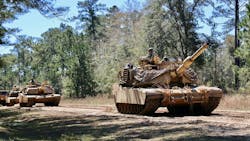Army researchers eye fuel cells to provide power for infantry wearable electronics on the leading edge
ADELPHI, Md. – When dismounted U.S. Army infantry are attacking fortified enemy positions, taking hostile fire and moving quickly to find the best points for continued assault -- battery power can determine mission success or failure, and even life or death. Fox News reports. Continue reading original article
The Military & Aerospace Electronics take:
13 Aug. 2019 -- Units of forward-positioned Army soldiers may not have quick access to battery recharging, and may depend entirely on their batteries for night vision, radios, small soldier-worn sensors, portable laptops for drone control, and other combat-essential items.
The Army Research Laboratory (ARL) in Adelphi, Md., is funding Cornell University in Ithaca, N.Y., to engineer small, portable, lightweight, durable, and long-lasting fuel cells to produce electricity.
This new effort focuses on creating an entirely new fuel cell over the next five years that seeks to replace hydrogen with methanol for smaller, safer, and more efficient electricity-generating fuel cells for soldiers in combat.
Related: Navy to field-test hydrogen fuel cell- and solar-powered military renewable energy system
Related: Army funds development of UltraCell micro fuel cell system
Related: NASA offers to partner with industry to develop advanced fuel cell technology for space
John Keller, chief editor
Military & Aerospace Electronics
